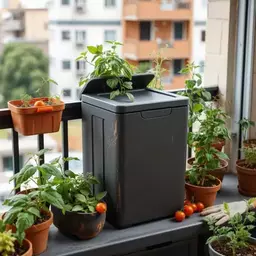Have you ever considered the impact your daily choices have on the environment? Embracing a low waste lifestyle can significantly reduce your ecological footprint while fostering a more fulfilling life. This guide offers practical insights into adopting sustainable habits and inspires positive change in both your life and the community.
What You Will Learn
- Understanding the core principles of a low waste lifestyle: reducing, reusing, and recycling.
- The environmental benefits of minimizing waste, including conserving natural resources and protecting wildlife.
- How to assess your personal progress in reducing waste through reflection and goal setting.
- Creating a personalized action plan to keep you on track and motivated in your low waste journey.
- Conducting waste audits to identify specific areas for improvement in your consumption habits.
- Building support networks to foster sustainable practices within your community.
- Inspiring others by sharing your low waste experiences and participating in local sustainability events.
Environmental Benefits of Reducing Waste
Reducing waste has numerous environmental benefits that contribute to a sustainable future. Below is a visual representation of these key benefits.
Conserving Natural Resources
By creating less waste, we reduce the demand for raw materials, allowing nature to thrive.
Lowering Greenhouse Gas Emissions
Less waste means less methane produced in landfills, helping combat climate change.
Protecting Wildlife
By reducing waste, we minimize pollution and the chances of harming animals who might ingest plastic or other harmful materials.
Encouraging Sustainable Practices
A low waste lifestyle promotes innovation in sustainable practices, paving the way for a greener future.
Understanding the Low Waste Lifestyle: A Beginner’s Guide
Starting your journey towards a low waste lifestyle might feel a bit overwhelming, but it doesn't have to be! At Eco Habits Daily, we believe that every small change can lead to a healthier planet. This guide will help you understand what a low waste lifestyle entails and why it is crucial for our environment.
A low waste lifestyle emphasizes minimizing waste through conscious choices in daily life. It involves reducing single-use plastics, opting for reusable products, and finding ways to recycle and compost. It’s about being mindful of our consumption habits and making intentional decisions that benefit not just ourselves, but the Earth too!
Defining a Low Waste Lifestyle and Its Importance
A low waste lifestyle is rooted in the concept of reducing, reusing, and recycling. It’s about being aware of the impact our consumption has on the environment and taking steps to lessen that impact. By adopting these practices, we not only help reduce landfill waste but also conserve resources for future generations. For more insights, consider reading about recycling tips for your home.
Many people are beginning to realize the importance of a low waste lifestyle. It not only fosters a sustainable environment but also can lead to a more fulfilling life. When we focus on quality over quantity, we often find ourselves making choices that align with our values and promote overall well-being.
Environmental Benefits of Reducing Waste
Reducing waste has numerous environmental benefits, which include:
- Conserving natural resources: By creating less waste, we reduce the demand for raw materials, allowing nature to thrive.
- Lowering greenhouse gas emissions: Less waste means less methane produced in landfills, helping combat climate change.
- Protecting wildlife: By reducing waste, we minimize pollution and the chances of harming animals who might ingest plastic or other harmful materials.
- Encouraging sustainable practices: A low waste lifestyle promotes innovation in sustainable practices, paving the way for a greener future.
By embracing these principles, we can actively contribute to protecting the environment and creating healthier communities. At Eco Habits Daily, we’re committed to empowering individuals to make eco-friendly choices that can lead to positive change!
Pro Tip
To make your low waste journey even more effective, consider implementing the "30-Day Low Waste Challenge." Each day, focus on one specific area where you can reduce waste—whether it's eliminating plastic bags, finding alternatives to single-use coffee cups, or trying out DIY eco-friendly cleaning products. This not only helps you stay engaged but also allows you to explore various aspects of sustainable living in a manageable way!
Reflecting on Your Low Waste Journey
As you embark on your low waste journey, taking a moment to pause and reflect can be incredibly valuable. It allows you to assess your progress and recognize the positive changes you've made. Remember, every small step counts, and by evaluating where you are, you can identify areas for further improvement. So, let’s dive into a few methods for assessing your impact and refining your approach!
Assessing Your Progress in Reducing Waste
One of the best ways to understand your journey is to look back at your initial habits compared to where you are now. For instance, consider the following aspects:
- How much waste did you produce weekly before starting?
- What changes have you made in your shopping habits?
- Have you reduced the amount of single-use plastics in your life?
It might also be helpful to set specific goals for yourself. For example, you could aim to reduce your waste by a certain percentage over the next month. This way, you can measure your success and stay motivated in your commitment to sustainable living.
Creating a Personal Action Plan for Continued Improvement
Once you’ve assessed your journey, it’s time to create a personal action plan. This plan will help you stay focused and committed to your low waste lifestyle. Here are some steps to consider:
- Identify the areas in your life that need more attention, such as food waste or personal care products.
- Set realistic and achievable goals for improvement.
- Research new low waste practices that you can incorporate into your routine.
Conducting Waste Audits to Track Your Impact
One effective method for understanding your waste footprint is conducting a waste audit. This process involves sorting through your trash to see what you’re throwing away. Here’s how you can do it:
- Collect your household waste for a week.
- Sort it into categories, such as food waste, recyclables, and non-recyclables.
- Analyze the results to identify trends and areas for reduction.
Encouraging Sustainable Practices Beyond the Individual
As you continue your low waste journey, remember that you’re not alone! Encouraging sustainable practices within your community can make a significant difference. Together, we can create a strong network that supports eco-friendly habits. Here are some ways to foster these practices beyond your personal efforts:
Building Support Networks for Low Waste Living
Connecting with like-minded individuals can enhance your low waste journey. Consider these ways to build your support network:
- Join local sustainability groups or online forums.
- Start conversations about low waste living with friends and family.
- Host or attend workshops focused on sustainable practices.
Sharing Your Low Waste Experiences to Inspire Others
Your journey can inspire others to follow suit! Here are some effective ways to share your experiences:
- Write blog posts or social media updates about your low waste practices.
- Share before-and-after pictures showcasing your progress.
- Engage in discussions about your journey during community events.
Participating in Sustainable Events and Workshops
Getting involved in local events can amplify your impact! Look for opportunities to participate in:
- Community clean-ups and tree planting days.
- Workshops on composting or eco-friendly living.
- Farmers' markets that promote local, sustainable products.
Recap of Key Points
Here is a quick recap of the important points discussed in the article:
- Embrace the Low Waste Lifestyle: Focus on reducing, reusing, and recycling to minimize waste and conserve resources.
- Assess Your Progress: Regularly evaluate your waste production and shopping habits to recognize improvements and set new goals.
- Create a Personal Action Plan: Identify areas for improvement, set achievable goals, and research new low waste practices to incorporate into your routine.
- Conduct Waste Audits: Analyze your waste by sorting it into categories to identify trends and opportunities for reduction.
- Build Support Networks: Connect with others in your community to share experiences, tips, and participate in sustainability initiatives.
- Share Your Journey: Inspire others by documenting and discussing your low waste practices through blogs, social media, and community events.
- Engage in Local Events: Participate in community activities that promote sustainability, such as clean-ups and workshops.
Frequently Asked Questions
Remember that adopting easy eco-friendly habits can significantly contribute to a more sustainable lifestyle.









